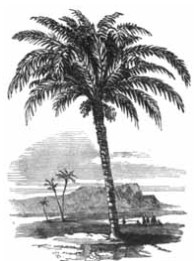 полная версия
полная версияThe Illustrated London Reading Book
The importance of this place was also so well appreciated by Bonaparte, that the battle of the 18th began by his attacking Hougoumont. This name, which was bestowed upon it by the mistake of our great commander, has quite superseded the real one of Château Goumont. The ruins are among the most interesting of all the points connected with this memorable place, for the struggle there was perhaps the fiercest. The battered walls, the dismantled and fire-stained chapel, which remained standing through all the attack, still may be seen among the wreck of its once beautiful garden; while huge blackened beams, which have fallen upon the crumbling heaps of stone and plaster, are lying in all directions.
On the field of battle are two interesting monuments: one, to the memory of the Hon. Sir Alexander Gordon, brother to the Earl of Aberdeen, who there terminated a short but glorious career, at the age of twenty-nine, and "fell in the blaze of his fame;" the other, to some brave officers of the German Legion, who likewise died under circumstances of peculiar distinction. There is also, on an enormous mound, a colossal lion of bronze, erected by the Belgians to the honour of the Prince of Orange, who was wounded at, or near, to the spot.
Against the walls of the church of the village of Waterloo are many beautiful marble tablets, with the most affecting inscriptions, records of men of various countries, who expired on that solemn and memorable occasion in supporting a common cause. Many of these brave men were buried in a cemetery at a short distance from the village.
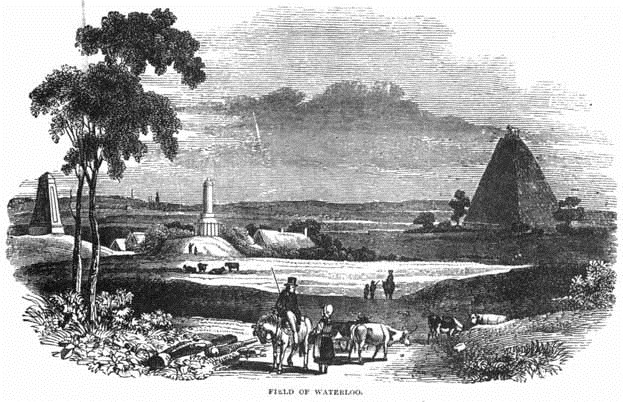
THE TWO OWLS AND THE SPARROW
Two formal Owls together sat,Conferring thus in solemn chat:"How is the modern taste decay'd!Where's the respect to wisdom paid?Our worth the Grecian sages knew;They gave our sires the honour due:They weigh'd the dignity of fowls,And pry'd into the depth of Owls.Athens, the seat of earned fame,With gen'ral voice revered our name;On merit title was conferr'd,And all adored th' Athenian bird.""Brother, you reason well," repliesThe solemn mate, with half-shut eyes:"Right: Athens was the seat of learning,And truly wisdom is discerning.Besides, on Pallas' helm we sit,The type and ornament of wit:But now, alas! we're quite neglected,And a pert Sparrow's more respected."A Sparrow, who was lodged beside,O'erhears them sooth each other's pride.And thus he nimbly vents his heat:"Who meets a fool must find conceit.I grant you were at Athens graced,And on Minerva's helm were placed;But ev'ry bird that wings the sky,Except an Owl, can tell you why.From hence they taught their schools to knowHow false we judge by outward show;That we should never looks esteem,Since fools as wise as you might seem.Would you contempt and scorn avoid,Let your vain-glory be destroy'd:Humble your arrogance of thought,Pursue the ways by Nature taught:So shall you find delicious fare,And grateful farmers praise your care;So shall sleek mice your chase reward,And no keen cat find more regard."Gay.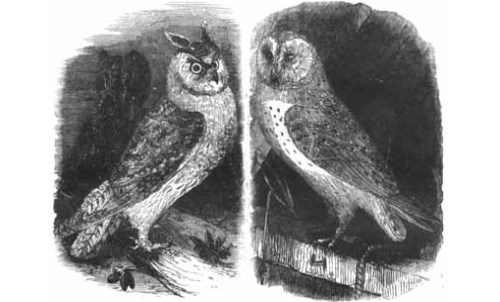
THE BEETLE

THE FOUNDING OF THE BELL
Hark! how the furnace pants and roars,Hark! how the molten metal pours,As, bursting from its iron doors,It glitters in the sun.Now through the ready mould it flows,Seething and hissing as it goes,And filling every crevice up,As the red vintage fills the cup—Hurra! the work is done!Unswathe him now. Take off each stayThat binds him to his couch of clay,And let him struggle into day!Let chain and pulley run,With yielding crank and steady rope,Until he rise from rim to cope,In rounded beauty, ribb'd in strength,Without a flaw in all his length—Hurra! the work is done!The clapper on his giant sideShall ring no peal for blushing bride,For birth, or death, or new-year tide,Or festival begun!A nation's joy alone shall beThe signal for his revelry;And for a nation's woes aloneHis melancholy tongue shall moan—Hurra! the work is done!Borne on the gale, deep-toned and clear,His long, loud summons shall we hear,When statesmen to their country dearTheir mortal race have run;When mighty Monarchs yield their breath,And patriots sleep the sleep of death,Then shall he raise his voice of gloom,And peal a requiem o'er their tomb—Hurra! the work is done!Should foemen lift their haughty hand,And dare invade us where we stand,Fast by the altars of our landWe'll gather every one;And he shall ring the loud alarm,To call the multitudes to arm,From distant field and forest brown,And teeming alleys of the town—Hurra! the work is done!And as the solemn boom they hear,Old men shall grasp the idle spear,Laid by to rust for many a year,And to the struggle run:Young men shall leave their toils or books,Or turn to swords their pruning-hooks;And maids have sweetest smiles for thoseWho battle with their country's foes—Hurra! the work is done!And when the cannon's iron throatShall bear the news to dells remote,And trumpet blast resound the note—That victory is won;When down the wind the banner drops,And bonfires blaze on mountain tops,His sides shall glow with fierce delight,And ring glad peals from morn to night—Hurra! the work is done!But of such themes forbear to tell—May never War awake this bellTo sound the tocsin or the knell—Hush'd be the alarum gun.Sheath'd be the sword! and may his voiceBut call the nations to rejoiceThat War his tatter'd flag has furl'd,And vanish'd from a wiser world—Hurra! the work is done!Still may he ring when struggles cease—Still may he ring for joy's increase,For progress in the arts of peace,And friendly trophies won;When rival nations join their hands,When plenty crowns the happy lands,When Knowledge gives new blessings birth,And Freedom reigns o'er all the earth—Hurra! the work is done!Mackay.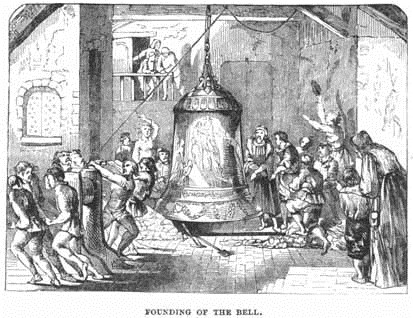
NAPOLEON
With his passions, and in spite of his errors, Napoleon was, taking him all in all, the greatest warrior of modern times. He carried into battle a stoical courage, a profoundly calculated tenacity, a mind fertile in sudden inspirations, which, by unlooked-for resources, disconcerted the plans of his enemy. Let us beware of attributing a long series of success to the organic power of the masses which he set in motion. The most experienced eye could scarcely discover in them any thing but elements of disorder. Still less, let it be said, that he was a successful captain because he was a mighty Monarch. Of all his campaigns, the most memorable are the campaign of the Adige, where the general of yesterday, commanding an army by no means numerous, and at first badly appointed, placed himself at once above Turenne, and on a level with Frederick; and the campaign in France in 1814, when, reduced to a handful of harrassed troops, he combated a force of ten times their number. The last flashes of Imperial lightning still dazzled the eyes of our enemies; and it was a fine sight to see the bounds of the old lion, tracked, hunted down, beset—presenting a lively picture of the days of his youth, when his powers developed themselves in the fields of carnage.
Napoleon possessed, in an eminent degree, the faculties requisite for the profession of arms; temperate and robust; watching and sleeping at pleasure; appearing unawares where he was least expected: he did not disregard details, to which important results are sometimes attached. The hand which had just traced rules for the government of many millions of men, would frequently rectify an incorrect statement of the situation of a regiment, or write down whence two hundred conscripts were to be obtained, and from what magazine their shoes were to be taken. A patient, and an easy interlocutor, he was a home questioner, and he could listen—a rare talent in the grandees of the earth. He carried with him into battle a cool and impassable courage. Never was mind so deeply meditative, more fertile in rapid and sudden illuminations. On becoming Emperor he ceased not to be the soldier. If his activity decreased with the progress of age, that was owing to the decrease of his physical powers. In games of mingled calculation and hazard the greater the advantages which a man seeks to obtain the greater risks he must run. It is precisely this that renders the deceitful science of conquerors so calamitous to nations.
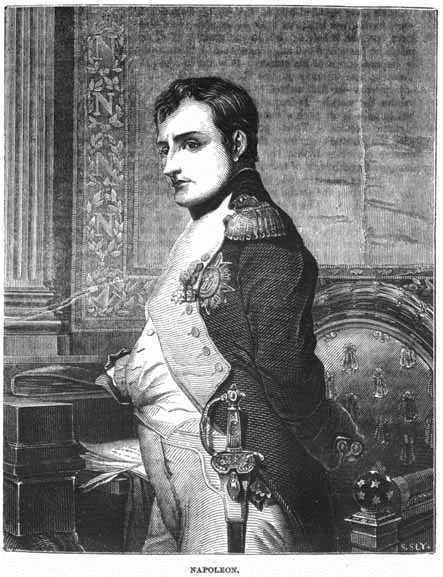
Napoleon, though naturally adventurous, was not deficient in consistency or method; and he wasted neither his soldiers nor his treasures where the authority of his name sufficed. What he could obtain by negotiations or by artifice, he required not by force of arms. The sword, although drawn from the scabbard, was not stained with blood unless it was impossible to attain the end in view by a manoeuvre. Always ready to fight, he chose habitually the occasion and the ground: out of fifty battles which he fought, he was the assailant in at least forty. Other generals have equalled him in the art of disposing troops on the ground; some have given battle as well as he did—we could mention several who have received it better; but in the manner of directing an offensive campaign he has surpassed all. The wars in Spain and Russia prove nothing in disparagement of his genius. It is not by the rules of Montecuculi and Turenne, manoeuvring on the Renchen, that we ought to judge of such enterprises: the first warred to such or such winter quarters; the other to subdue the world. It frequently behoved him not merely to gain a battle, but to gain it in such a manner as to astound Europe and to produce gigantic results. Thus political views were incessantly interfering with the strategic genius; and to appreciate him properly, we must not confine ourselves within the limits of the art of war. This art is not composed exclusively of technical details; it has also its philosophy.
To find in this elevated region a rival of Napoleon, we must go back to the times when the feudal institutions had not yet broken the unity of the ancient nations. The founders of religion alone have exercised over their disciples an authority comparable with that which made him the absolute master of his army. This moral power became fatal to him, because he strove to avail himself of it even against the ascendancy of material force, and because it led him to despise positive rules, the long violation of which will not remain unpunished. When pride was bringing Napoleon towards his fall, he happened to say, "France has more need of me than I have of France." He spoke the truth: but why had he become necessary? Because he had committed the destiny of France to the chances of an interminable war: because, in spite of the resources of his genius, that war, rendered daily more hazardous by his staking the whole of his force and by the boldness of his movements, risked, in every campaign, in every battle, the fruits of twenty years of triumph: because his government was so modelled that with him every thing must be swept away, and that a reaction, proportioned to the violence of the action, must burst forth at once both within and without. But Napoleon saw, without illusion, to the bottom of things. The nation, wholly occupied in prosecuting the designs of its chief, had previously not had time to form any plans for itself. The day on which it should have ceased to be stunned by the din of arms, it would have called itself to account for its servile obedience. It is better, thought he, for an absolute prince to fight foreign armies than to have to struggle against the energy of the citizens. Despotism had been organized for making war; war was continued to uphold despotism. The die was cast—France must either conquer Europe, or Europe subdue France. Napoleon fell—he fell, because with the men of the nineteenth century he attempted the work of an Attila and a Genghis Khan; because he gave the reins to an imagination directly contrary to the spirit of his age; with which, nevertheless, his reason was perfectly acquainted; because he would not pause on the day when he felt conscious of his inability to succeed. Nature has fixed a boundary, beyond which extravagant enterprises cannot be carried with prudence. This boundary the Emperor reached in Spain, and overleaped in Russia. Had he then escaped destruction, his inflexible presumption would have caused him to find elsewhere a Bayleu and a Moscow.
General Foy.ROME
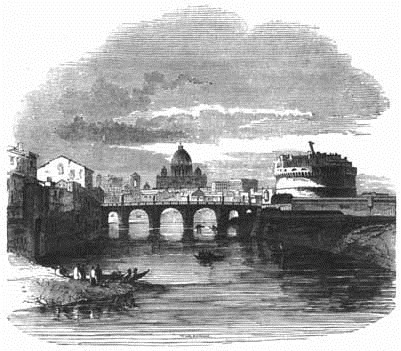
THE ROOKERY
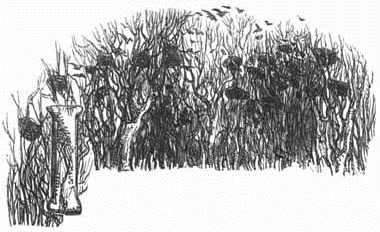
Is that a rookery, papa?
Mr. S. It is. Do you hear what a cawing the birds make?
F. Yes; and I see them hopping about among the boughs. Pray, are not rooks the same with crows?
Mr. S. They are a species of crow. But they differ from the carrion crow and raven, in not feeding upon dead flesh, but upon corn and other seeds and grass, though, indeed, they pick up beetles and other insects and worms. See what a number of them have alighted on yonder ploughed field, almost blackening it over. They are searching for grubs and worms. The men in the field do not molest them, for they do a great deal of service by destroying grubs, which, if suffered to grow to winged insects, would injure the trees and plants.
F. Do all rooks live in rookeries?
Mr. S. It is their nature to associate together, and they build in numbers of the same, or adjoining trees. They have no objection to the neighbourhood of man, but readily take to a plantation of tall trees, though it be close to a house; and this is commonly called a rookery. They will even fix their habitations on trees in the midst of towns.
F. I think a rookery is a sort of town itself.
Mr. S. It is—a village in the air, peopled with numerous inhabitants; and nothing can be more amusing than to view them all in motion, flying to and fro, and busied in their several occupations. The spring is their busiest time. Early in the year they begin to repair their nests, or build new ones.
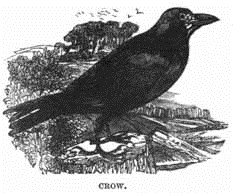
F. Do they all work together, or every one for itself?
Mr. S. Each pair, after they have coupled, builds its own nest; and, instead of helping, they are very apt to steal the materials from one another. If both birds go out at once in search of sticks, they often find at their return the work all destroyed, and the materials carried off. However, I have met with a story which shows that they are not without some sense of the criminality of thieving. There was in a rookery a lazy pair of rooks, who never went out to get sticks for themselves, but made a practice of watching when their neighbours were abroad, and helping themselves from their nests. They had served most of the community in this manner, and by these means had just finished their own nest; when all the other rooks, in a rage, fell upon them at once, pulled their nest in pieces, beat them soundly, and drove them from their society.
F. But why do they live together, if they do not help one another?
Mr. S. They probably receive pleasure from the company of their own kind, as men and various other creatures do. Then, though they do not assist one another in building, they are mutually serviceable in many ways. If a large bird of prey hovers about a rookery for the purpose of carrying away the young ones, they all unite to drive him away. And when they are feeding in a flock, several are placed as sentinels upon the trees all round, to give the alarm if any danger approaches.
F. Do rooks always keep to the same trees?
Mr. S. Yes; they are much attached to them, and when the trees happen to be cut down, they seem greatly distressed, and keep hovering about them as they are falling, and will scarcely desert them when they lie on the ground.
F. I suppose they feel as we should if our town was burned down, or overthrown by an earthquake.
Mr. S. No doubt. The societies of animals greatly resemble those of men; and that of rooks is like those of men in the savage state, such as the communities of the North American Indians. It is a sort of league for mutual aid and defence, but in which every one is left to do as he pleases, without any obligation to employ himself for the whole body. Others unite in a manner resembling more civilised societies of men. This is the case with the heavers. They perform great public works by the united efforts of the whole community—such as damming up streams and constructing mounds for their habitations. As these are works of great art and labour, some of them probably act under the direction of others, and are compelled to work, whether they will or not. Many curious stories are told to this purpose by those who have observed them in their remotest haunts, where they exercise their full sagacity.
F. But are they all true?
Mr. S. That is more than I can answer for; yet what we certainly know of the economy of bees may justify us in believing extraordinary things of the sagacity of animals. The society of bees goes further than that of beavers, and in some respects beyond most among men themselves. They not only inhabit a common dwelling, and perform great works in common, but they lay up a store of provision, which is the property of the whole community, and is not used except at certain seasons and under certain regulations. A bee-hive is a true image of a commonwealth, where no member acts for himself alone, but for the whole body.
Evenings at Home.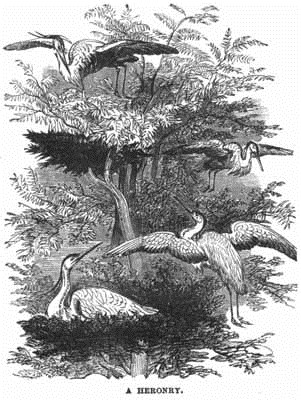
PALMS
These beautiful trees may be ranked among the noblest specimens of vegetation; and their tall, slender, unbranched stems, crowned by elegant feathery foliage, composed of a cluster of gigantic leaves, render them, although of several varieties, different in appearance from all other trees. In some kinds of palm the stem is irregularly thick; in others, slender as a reed. It is scaly in one species, and prickly in another. In the Palma real, in Cuba, the stem swells out like a spindle in the middle. At the summit of these stems, which in some cases attain an altitude of upwards of 180 feet, a crown of leaves, either feathery or fan-shaped (for there is not a great variety in their general form), spreads out on all sides, the leaves being frequently from twelve to fifteen feet in length. In some species the foliage is of a dark green and shining surface, like that of a laurel or holly; in others, silvery on the under-side, as in the willow; and there is one species of palm with a fan-shaped leaf, adorned with concentric blue and yellow rings, like the "eyes" of a peacock's tail.
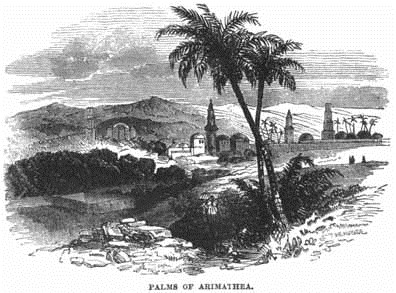
The flowers of most of the palms are as beautiful as the trees. Those of the Palma real are of a brilliant white, rendering them visible from a great distance; but, generally, the blossoms are of a pale yellow. To these succeed very different forms of fruit: in one species it consists of a cluster of egg-shaped berries, sometimes seventy or eighty in number, of a brilliant purple and gold colour, which form a wholesome food.
South America contains the finest specimens, as well as the most numerous varieties of palm: in Asia the tree is not very common; and of the African palms but little is yet known, with the exception of the date palm, the most important to man of the whole tribe, though far less beautiful than the other species.
THE PALM-TREE
